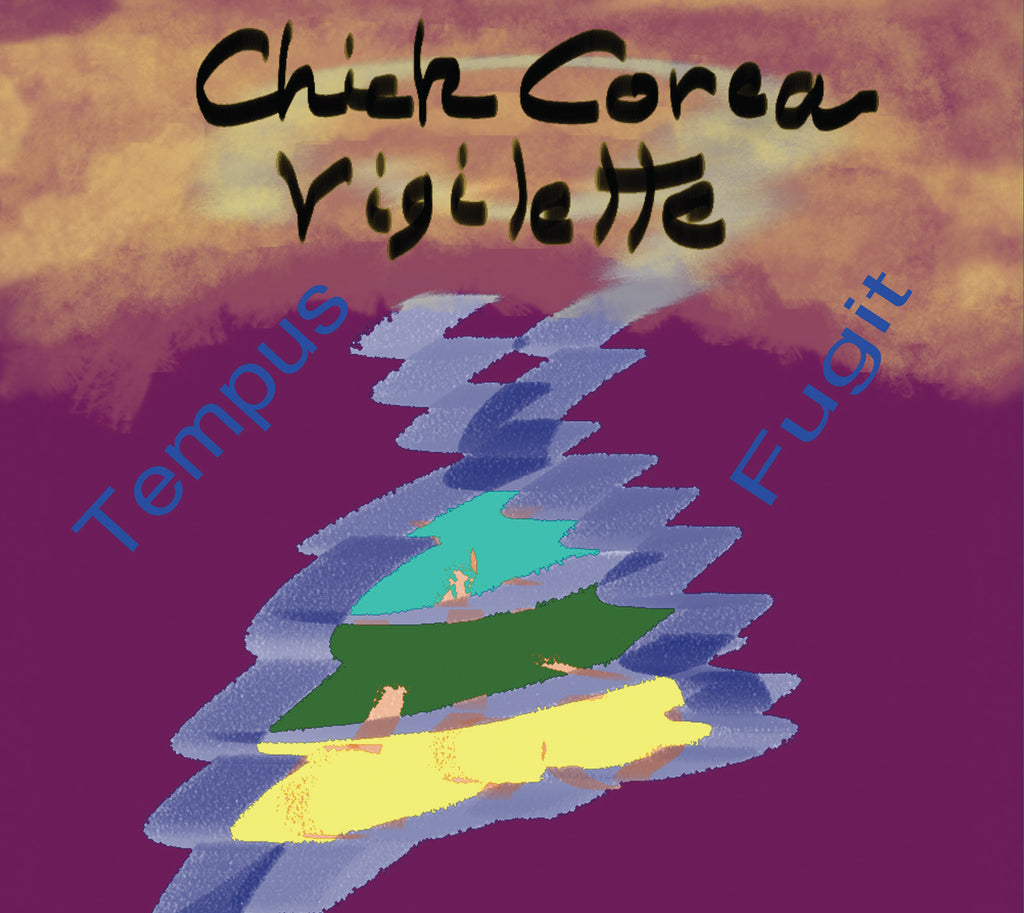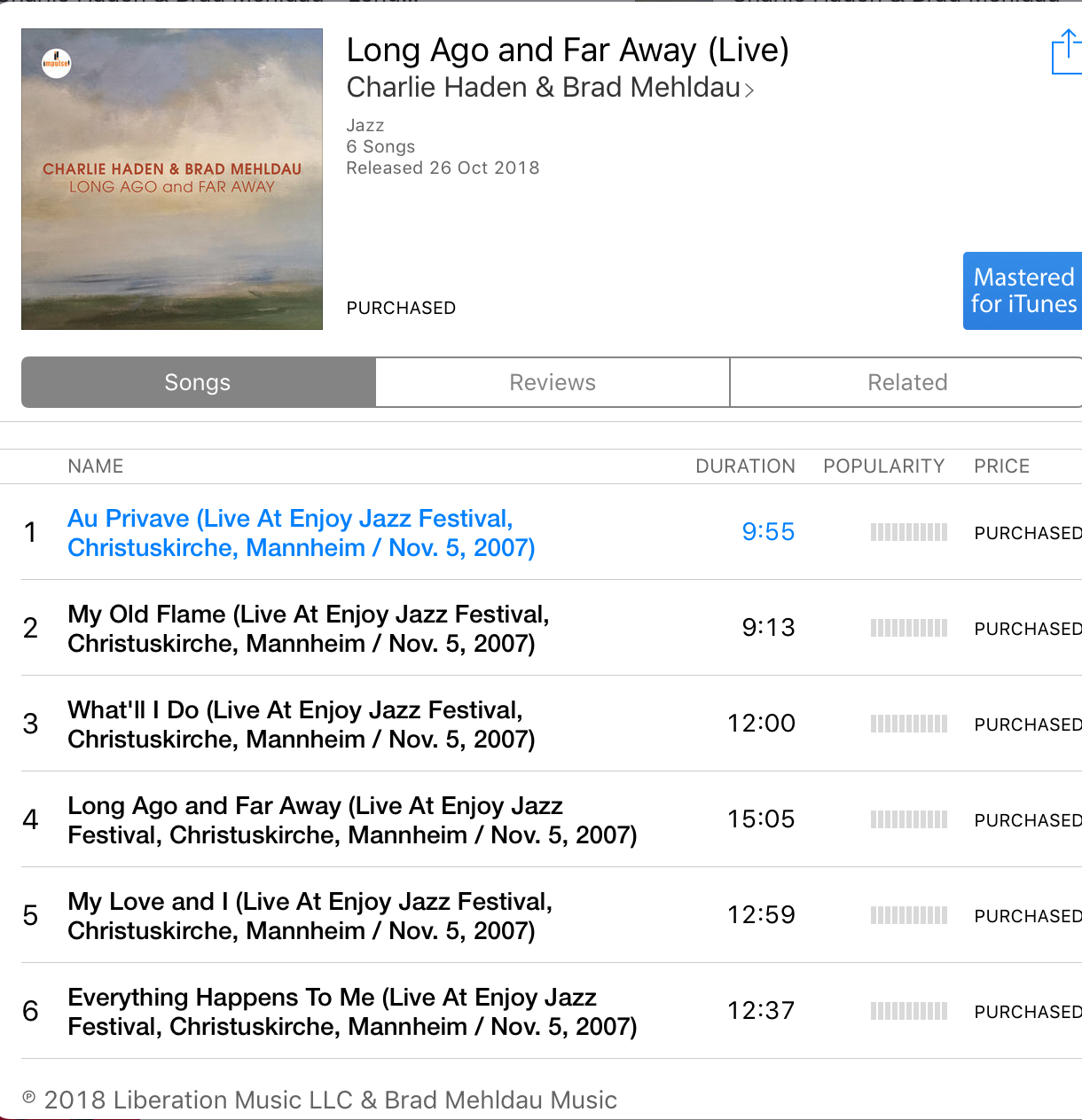Criticism, fiction and other writing
I just ordered a CD for the first time in 3 years or so. It’s Tempus Fugit by Chick Corea’s Vigilette trio and I’ve wanted to listen to it since I first heard about it nearly 2 years ago. The drummer in the trio is Marcus Gilmore, whose playing I know from his work with Vijay Iyer. (As well as having their albums, I saw Iyer’s trio live in Toulouse in about 2010.) Marcus Gilmore is the grandson of Roy Haynes, who played drums on some of Corea’s best trio recordings, notably Now He Sings, Now He Sobs and Trio Music: Live in Europe.

I ordered Tempus Fugit in CD format because that’s the only way I could get it. It’s not on any of the streaming or download sites and can be obtained only from Corea’s website or at one of his concerts. Postage (shipping, if you prefer) from the United States is $14, bringing the total cost of the disc to $34, more than I’ve paid for a single album in at least 10 years. I hesitated to order it at that price without having heard it first. While I like Corea’s music in general, it’s very varied and I certainly don’t enjoy all of it to the same degree. Then I found a recording of Vigilette playing live in Boston and that clinched it: I ordered the album. (I had previously searched NPR.org for “Vigilette” and “Chick Corea” and got no relevant hits.)
Up to 2017, I had preferred to buy music on CD. I would download something from iTunes if the CD was hard to get hold of (an import, or out of print) or exorbitantly priced, but I’d always buy the CD where it was practical to do so, particularly if it came in a Digipak-type cover. (Jewel cases weren’t nearly so appealing: they were cheap-looking, easily cracked and took up too much space, being more than twice the width a CD cover needed to be.) Then, three years ago, it struck me that it was no longer practical to keep accumulating CDs. They were bulky to store, I hadn’t owned an audio CD player for years, and ripping them was a time-consuming chore.
Though they were introduced in the early 80s, I didn’t hear a CD being played until 1986 and bought my first one only in 1989. I quickly became enthusiastic about the format. My ex-wife used to say that I could scratch a vinyl record just by looking at it, and she was exaggerating only slightly. CDs saved me from the effects of my own clumsiness. Partly for this reason, I’ve never been tempted to join the vinyl revival. I have, on the other hand, sometimes considered reverting from downloads to CDs.
This is not because I have any aesthetic attachment to the format itself. A CD is nothing more than a cheap, plastic disc on which digital files are stored. It’s no more appealing than any other storage medium, such as a USB thumb drive or an external hard disk. My nostalgia for CDs is based on two factors: (a) they come in physical covers which usually contain liner notes and (b) if you rip them you have full control over the metadata you attach to the track.
If you buy a digital download from certain publishers, it’s likely that it will be accompanied by a “digital booklet” consisting of a pdf file. This is a poor substitute for its printed counterpart and, if you’re not careful, will end up occupying some of the limited and precious place on your music player/phone. Years ago, I used to argue that, whenever you buy an album as a digital download, you should have the option of getting a copy of the liner notes or Digipak mailed to you. Apart from anything else, it could function as a physical reminder that you bought an album which might otherwise languish overlooked on a hard drive or in flash memory. I still think the music publishing companies should consider this approach as a way of making sales (downloads) more attractive than a subscription model.
But the thing I most dislike about downloads and streaming alike is the poor quality of the metadata, the information attached to each track such as artist, album artist, song and album titles, publication date, composer name and so on. This is typically inconsistent from one album to another and is often just plain wrong. One of my biggest bugbears is that, in the case of a live album, you will almost invariably find some variation of “(Live)” or “- Live” appended to the song titles, even though it should be obvious to the most inattentive record company intern that “(Live)” is not actually part of the title. The worst example of this phenomenon I’ve yet found is an (excellent) album by Charlie Haden and Brad Mehldau, where every song title ends “(Live at Enjoy Jazz Festival, Christuskirche, Mannheim / Nov. 5, 2007)”. The parenthetical note is longer than the actual song title in each case.

Different authors of metadata have differing views on whether “Year” should be the year of first publication, year of recording, or year of the current rerelease. (For what it’s worth, I prefer the first of these.) Where it’s an instrumental performance (I listen to a lot of jazz piano versions of standards), should the lyricist be credited as well as the composer — “Washington/Young” or “Victor Young”; “Kosma/Prévert”, “Kosma/Mercer” or “Joseph Kosma”? (There are arguments both ways but I’d like consistency, where possible.)
Of course I could amend the metadata on a digital download but it’s a tedious process (made worse by the fact that I don’t have a Mac at the moment, so have to use iTunes on Windows). Worse, whenever you get a new device (or possibly reset/reformat an old one) you risk downloading your purchases again, with the original, defective metadata. It’s easier (though still tedious) to rip the CD and add the metadata from scratch — and, up to three years ago, that’s what I generally did.
It’s for this reason that I periodically find myself thinking that maybe I should go back to buying CDs and avoid digital downloads (except where the CD is hard to find or too expensive). Unfortunately, I don’t think it’s practical. I already have too many CDs and nowhere permanent to store them. Six months ago, I had to move out of where I was living and I resolved to give away all the CDs that I could bear to part with, including all those in jewel cases. In the end, I managed to divest myself of only a handful.
It seems there isn’t a completely satisfactory answer to the conundrum. So, for now, I’m going to continue to buy my music from iTunes and manually amend the metadata, when I get around to it, swearing furiously as I go.
Posted by Art on 28-Mar-2020.